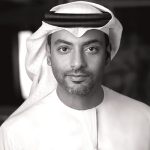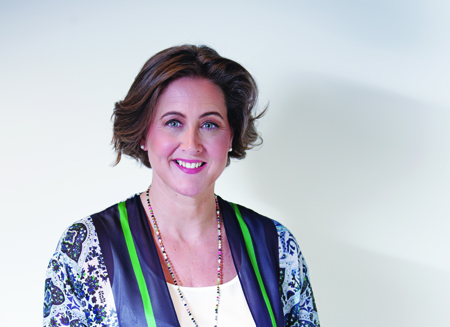In an exclusive interview with BroadcastPro ME, Amanda Turnbull, Vice President and Country Manager of Discovery Networks MENA, discloses news about the company's impending launches in the region and what being an independent entity means for the local office.

In an exclusive interview with BroadcastPro ME, Amanda Turnbull, Vice President and Country Manager of Discovery Networks MENA, discloses news about the company’s impending launches in the region and what being an independent entity means for the local office
How did you come to be at Discovery?
I started in print and was based in Hong Kong until 2007, when I joined Discovery
Communications Europe as Director, Advertising Sales for Emerging Markets. I have been handling emerging markets for many years now. I joined the Discovery Networks CEEMEA team in 2010 and then came to Dubai in 2014 in the role of Vice President and Country Manager of Discovery Communications, UAE.
Thats when we moved Fatafeat to Dubai Studio City. Initially, my role involved developing Fatafeat and creating more value for the brand. It was a loved and trusted brand but needed a bit of a boost. It needed a policy to develop it on-screen, off-screen and build more traction for its digital offerings. I am super proud of the way it has shaped up. I have a lot of people to thank for sharing their knowledge and experience with me, and helping me establish a strong foothold in broadcast.
Was buying Fatafeat the first of Discoverys ambitious moves to this region?
Discovery has been operating in the Middle East for 17 years, but we were not physically present on the ground until quite recently. Having a local team in Dubai Studio City has enabled us to build relationships, find partnerships and be extremely collaborative.
Discovery bought over Takhayal Entertainment and its flagship channel Fatafeat in 2013. We bought their production business in Cairo and Dubai, along with the TV channel and the website. This was a big move that went on to show how important the Middle East market was for us. There has been substantial investment in setting up a local base in Dubai, again showing our commitment towards the region. Our team here has grown from 20 to 35 and we are still expanding.
What did Fatafeat’s move from FTA to pay entail? What challenges did you face in the process?
Yes, we moved Fatafeat from free-to-air to beIN’s pay platform on April 1 this year. There was a reason to take Fatafeat out of FTA to pay. Its very difficult with only one FTA channel and not a portfolio to generate ad sales.
I am pleased that we have changed the model on Fatafeat. Now we have a more stable structure. As a result of that, we can now invest more in the brand and the viewer gets a better deal. The viewers get more content, more consistently. It was a difficult decision but the right one.
FTA ad sales is a high-pressure, stressful business model. Pay has its own set of challenges. Digital, on the other hand, is more transparent and more accountable.
We hear theres a lot of expansion happening in Discoverys regional office at the moment?
Yes, the good news is that our region is now independent, which is exciting. We were part of the emerging business previously; now we are an independent hub, reporting directly to Kasia Kieli, President and Managing Director at Discovery Networks CEEMEA, based in Discoverys CEEMEA headquarters in Warsaw. CEEMEA is a huge region with multiple markets also covering the Middle East. We have essentially stabilised the business in the Middle East and developed pay, digital as well as free-to-air products. We can stand on our own feet in this region.
As a result, we have also decided to move the playout of all our MENA channels to Dubai. The channels that have been coming to this region were played out from London previously, and moving the playout to the Dubai hub is a huge departure for us.
We have local playout from London, Italy, Germany, Turkey and now Dubai. The MENA channels are now being played out from du Samacom on Nilesat. This is a very recent development. Fatafeat has been playing out from since 2006. We were happy to extend our relationship with du Samacom, who have upgraded their facilities for clarity and DVB subtitling to meet Discoverys specifications.
Not only are we now scheduling locally but also making the acquisition and production conversations locally. The packaging and versioning of all of these channels are done from here.
Our Middle East team curates these channels. Being based here, they have a good understanding of what the audience wants to watch. Of course, moving these channels here also means we now have more edit suites, more software and Signiant connections, which are some of the key upgrades that are being undertaken in the Dubai office.
We have a studio for local production in Dubai Production City (formerly IMPZ), where content for Fatafeat is produced. We may take more studio space and expand our production facilities for other channels as well.
An Arabic talk show hosted by Iraqi-born humanitarian Zainab Salbi, Nidaa, was the first local commission for TLC (Discoverys lifestyle channel), launched in 2015. we hope to re-commission a second season of Nidaa, for broadcast next year on TLC, on OSN.
You have signed several deals with local networks. Please elaborate on your recent deals and your business model for platforms in the region.
Yes, we are in the lucky position of having so much global content to create these channels.
When we came in conversation with beIN, Fatafeat was the flagship brand for them. Their sports portfolio was already quite robust and they wanted to develop their pay offerings further with more family and female programmes.
On April 1, we launched Fatafeat HD, Animal Planet HD and DTX HD with beIN. On August 1, DKids HD, Dlife HD and DMAX HD were launched. Dlife HD offers family-oriented programmes offering more than food and cooking. Theres parenting, education, relationships, travel etiquette, family the content of this channel is global.
Discovery Kids HD was the number one kids channel in Latin America. We see a huge off-air opportunity with that and plan to create characters and local events around it.
DTX HD is a pure turbo channel with a lot of stuff about wheels. It is targeted at a younger audience. DMAX HD is targeted at older males and has lots of adrenaline, extreme fishing, survival, engineering, military and so on. This is a great opportunity to engage more deeply with beINs existing audience and move them to family entertainment.
Any new launches in the pipeline that you can share with us exclusively?
We will be launching a Farsi channel called Home and Health this autumn. We have licensed the Home and Health product to a company called BHS, which is supported by Eutelsat. BHS will run the Farsi-language channels in Iran and the Middle East. They will manage the channel for us.
We consider Iran to be a high potential market and the new channel will have a mix of library content as well as original local productions. This is a sort of relationship we have with Image Nation in Abu Dhabi for Quest Arabiya. It involves a licensing deal with a share of ad revenue as well, and we remain an active partner.
There seems to be concerns in the market that Discovery is encouraging a bidding war between OSN and beIN and diluting exclusivity?
We see it differently. We are a global player and are in the happy position of having this enormous content library that we invest in heavily. Discovery invests $2.5bn annually in developing content, and this does not even include the investment in sports rights, Olympics and so on. We want to make sure that our content is available on as many platforms and to as many viewers as possible.
There is a difference between the two portfolios OSN and beIN. OSN is a long-standing partner and they still have all the channels they have always had. We have a six-channel deal with OSN that includes TLC, Animal Planet, Discovery Science, Discovery Family and IDX.
We have got a brand-new scripted show coming up on Discovery titled Harley and the Davidsons. There will be a big event around that programme to engage OSN subscribers.
What is Discoverys growth strategy for this region? Do you also do branded content?
This is an important region for us. Our goal is to get the content out on as many different platforms as possible, be it digital or OTT, pay or FTA. Our offerings are no longer limited to these screens; we also have experiential products and leverage the opportunity we have in the regions malls.
Globally, what we are getting very good at is buying good sports rights, with a passionate fan following. These have a super fan following and are on social media that drives the products. This is what we are doing with TLC they have these super fans who are on social media; they are our biggest advocates. We are trying to link together our linear products with social media and digital verticals. Thats an interesting strategy for us. We want to engage with the young tech-savvy population in the region to gain maximum traction on our products.
We havent yet delved into branded content. We started ad sales on Discovery and TLC last year and consider ourselves relatively new to that.
If you give your time to any screen, you want something back in return. You want the security of knowing that your valuable time will be repaid.
We have also moved from just being factual entertainment to encompass a brilliant mix of scripted channels, kids entertainment and sports.
What is the secret to penetrating different markets? Discovery is now in 230 countries; how do you ensure content is relevant to so many different people and cultures?
In the pay space particularly, you have this socio-economic group of people who can pay for TV.
These are people who are global consumers, they travel everywhere, watch TV everywhere and on multiple screens. What we offer on our channels is aspirational but also relevant and real for this socio-economic class.
Through the prism of this content, they can see an impact on their lives. Take the example of Jo Frost (Supernanny), which we plan to bring to this region. She has a huge following in the free-to-air market and we will now have exclusive content with her in the pay-TV space. We would like to bring her to the region and do experiential events with her. Thats something we feel is important to make it more relevant to the local audience. We see an opportunity to develop a huge off-air platform for the show.
We launched the first Discovery Store in the region with Emaar and Dubai Aquarium. Its located in Dubai Mall. All the stuff in the store has eco stories behind them, and a percentage of the proceeds from the sale of products at the store goes back to various charities around the world. The first ever Shark Week was held in August in Dubai Mall, also in association with Emaar and Dubai Aquarium.
Products like these give us a complete 360-degree approach that includes linear, digital and experiential. Through these programmes and events, we aim to enter peoples lives in a meaningful and authentic way.
How do you choose products for this region?
I am deeply involved in anything that happens in this region. Having a presence here, we are on the ground building relationships and we know whats going on. Now that we are here, we can spot these opportunities to tailor-make products to the regions requirements. We brainstorm with local partners, and based on the feedback on the ground, we relay this information to Discoverys Consumer Products division, which is responsible for developing brands.
Shark Week and the Discovery Store are part of this initiative. We are very committed to our products and content packaging and the platforms we use. Our deal with Emaar and OSN is a tripartite agreement with each partner in a happy position.
Do you create content exclusively for this region or is there an opportunity to share that with your global channels?
Our studio in Dubai produces content every day, and we have plans for more. The point to make is we dont make content for just one region. Whatever is created in one region runs elsewhere also, based on its relevance to that particular market. Having said that, most of our content has a global appeal. All the content that Discovery produces goes into a centralised content library where everybody makes a contribution.
Discovery has grown from being a very US-centric company to one that makes more money outside of the US and has more content sources outside of the US today. A very big TLC celebrity, for in-stance, wants to do something in the Middle East, and if we did that, the programme would run everywhere, not just in this region.
What is the outlook for the local pay-TV market? Where is the Middle East headed in terms of TV viewing?
Pay is still small here, but it is influencing the dynamics of this market. Pay TV in the region is growing at around 8% annually, I hear, and thats where we see opportunity. There is a growing realisation in the region that you need to pay for quality.
This perception has percolated into the region now, and it will be very interesting to watch whats going to happen.
Traditionally, free-to-air has been a strong medium, as we all know, and we have leveraged this opportunity to grow our channels in North Africa. We have a widespread free-to-air network as well, but we need to have the right partners to achieve that.
Fatafeat may have transitioned to a pay environment. But we have to work hard to make sure we are still connected to the consumers by way of experiential offerings. Fatafeat will be touring around and you will see Fatafeat-related events in shopping malls near you, across the region. We have a big commitment in digitising the channel to make sure we dont lose our existing audience. In order to achieve that, we are investing heavily in digital and Fatafeats direct-to-consumer app and VOD platform.
Do you have any statistics to show how Fatafeat is faring on different platforms?
Fatafeat has a VOD platform, Fatafeat Play (http://play.fatafeat.com/home), and as of July 2016, it had 347,970 total video views. Fatafeat also has an Instagram page, and as of now, it has 239,000 followers (www.instagram.com/fatafeatchannel/).
There is opportunity with Fatafeat to serve it globally, but we need to serve our core audience first. Fatafeat content is running on TLC in Turkey, which is great for us to start cross-pollinating.
What are your biggest growth areas?
Saudi drives revenue in FTA, and thats going to be the case for a while. Our growth policy is to get into the local market in a meaningful way and build credible relationships and partnerships. The idea is to take what works in other parts of the world and make it work here with a local spin on it.
We have a pan regional approach Farsi, Egypt, North Africa but each of these is a very distinct market to operate in. With the right partners on the ground, its a win-win situation for both, as we bring to our local partners global content opportunities and they in turn give us knowledge about local markets.
We are always looking for more deals. You’ve got to bring something that your local partner appreciates. We are an active partner in all the deals that we sign. When we sign a deal, we are committed to making it work and seeing where we can leverage our expertise. Thats how our relationship with Image Nation has thrived since we signed up with them. Quest Arabiya is among the top 20 channels in the UAE today.
What is your view of competition in this region?
There is enough space for all of us. More than dealing with competition, its about developing pay TV here in general rather than fighting amongst each other. We come together with other global content owners when necessary to work for the benefit of the market.
We could get further if we worked more collaboratively. Its about demonstrating the value of pay TV but all the way back to B2B and B2C relationships. People understand that it’s worth paying for quality content. It will improve over time when you have a more globally aware population. There is still enormous growth potential for pay in the region unlike Western Europe, where it has maxed out thats why it is such a key focus for Discovery.
Discovery has a very collaborative approach to growth; we believe in building long-term relationships and partnerships. We see value in building local connections. Our global products have gained more traction by working with local partners.
By Vibhuti Arora and Vijaya Cherian















































































